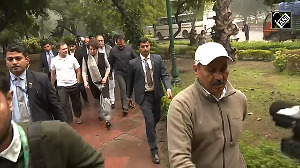The United States has made it clear that it was not averse to wrapping up the nuclear deal with a minority government in India, seeking to set at rest questions over the fate of the agreement if Left parties were to withdraw support to ruling United Progressive Alliance.
'Our basic government position is that we can sign an agreement with a duly-constituted government, whatever its political status,' US Assistant Secretary of State Richard Boucher said in an interview to Outlook magazine.
He was responding when referred to External Affairs Minister Pranab Mukherjee's comment that a minority government 'cannot, need not and should not sign a major agreement' like the nuclear deal.
'As long as it is duly-constituted government of the country, we can sign a deal with it,' Boucher said.
India and the US have concluded negotiations on the 123 agreement for cooperation in civil nuclear field but are yet to sign it formally.
There have been questions as to whether the agreement can be signed if the Left parties, which are opposed to the deal, withdraw support to the minority Manmohan Singh government.
Asked whether Indian officials discussed the possibility of signing a deal with a minority or a caretaker government, Boucher said, 'I don't remember it actually coming up at all during my meetings with Indian officials.'
Quizzed further on Mukherjee's remarks, the US official said 'that is a political judgement that the Foreign Minister in his political role is going to make. That's not a matter of precedent'.
On criticism that the US was putting pressure by setting deadlines, Boucher said his government was only trying to make people 'aware of our timelines'.
'The timeline that we got from the (US) Congress is that it (deal) has to get to the Congress so that it can act on it by July. That means it has to go to Congress in June,' he said.
The US Congress is to have a final vote on the deal after India firms up a safeguards agreement with International Atomic Energy Agency and seeks a waiver from the 45-nation Nuclear Suppliers Group for having trade with international community in the atomic field.
On what would happen to the deal if it is not concluded by the end of the Bush administration, Boucher said 'I don't know. I don't think any of us wants to throw it into that unknown limbo. Certainly, I don't think anybody will throw away everything that we have done. But they (next administration) might also try to take a different approach to finishing it. Whether that would work or not, we just don't know.'






 © 2024 Rediff.com -
© 2024 Rediff.com -